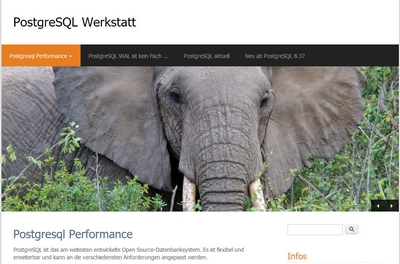Sammlung von Newsfeeds
Boriss Mejias: Contributions for the week of 2025-07-14 (Week 29)
Three events published their schedule. Here are the Program Committees behind that work. Registrations are open for these three events.
Laurenz Albe: Who are the PGDG?
© Laurenz Albe 2025
You may have encountered the abbreviation PGDG or the long version “PostgreSQL Global Development Group” in the PostgreSQL license text, the name of installation packages and elsewhere. But have you ever stopped to think who this mysterious organization is? Have you ever wondered how one becomes a member? Then read on.
Andreas 'ads' Scherbaum: Peter Zaitsev
Ashutosh Bapat: Perks of speaking at PostgreSQL conferences
A couple weeks back, I received my speaker's gift from POSETTE: An Event for Postgres.
Bruce Momjian: Presentation Updates
I regularly update my slides to reflect improvements, corrections, and changes to Postgres. Recently I have made changes to two of my slide decks that I would like to highlight. First, my talk Postgres Scaling Opportunities is a rarely-presented deck about the ways Postgres can be scaled. One thing I always felt diminished the usefulness of that presentation was a clear explanation of why scaling databases is so complex.
Regina Obe: PostGIS 3.6.0beta1
The PostGIS Team is pleased to release PostGIS 3.6.0beta1! Best Served with PostgreSQL 18 Beta2 and soon to be released GEOS 3.14.
This version requires PostgreSQL 12 - 18beta2, GEOS 3.8 or higher, and Proj 6.1+. To take advantage of all features, GEOS 3.14+ is needed. To take advantage of all SFCGAL features, SFCGAL 2.2.0+ is needed.
Ashutosh Bapat:
A couple weeks back, I received my speaker's gift from POSETTE: An Event for Postgres.
Gülçin Yıldırım Jelínek: pgroll is on a roll! We hit 5k stars on Github
Henrietta Dombrovskaya: July Prairie Postgres PUG
I am very thankful to everyone who attended yesterday’s meetup! I must be completely honest: I am always pleasantly surprised when people attend our summer meetups. There are so many better things you can do in Chicago in summer!
I am especially thankful to our speaker, Robert Ismo, who delivered a very interactive presentation about AI and Postgres and kept the audience engaged. In fact, the lively discussion lasted until I had to go to catch my train and asked people to relocate to continue their discussion, so I can’t even tell how long it lasted :).
Alexander Korotkov: OrioleDB fastpath search
When you optimize the CPU time of a transactional database management system, it comes down to one question: how fast can you read a page without breaking consistency? In this post, we explore how OrioleDB avoids locks, trims memory copies, and — starting with beta12 — even bypasses both copying and tuple deforming altogether for fixed-length types during intra-page search. This means that not only are memory copies skipped, but the overhead of reconstructing tuples is also eliminated. The result: an even faster read path, with no manual tuning required.
Robert Haas: One Year of Hacking Workshops
semab tariq: A Guide to Deploying Production-Grade Highly Available Systems in PostgreSQL
In today’s digital landscape, downtime isn’t just inconvenient, it’s costly. No matter what business you are running, an e-commerce site, a SaaS platform, or critical internal systems, your PostgreSQL database must be resilient, recoverable, and continuously available. So in short
High Availability (HA) is not a feature you enable; it’s a system you design.
Tudor Golubenco: Reaction to the PlanetScale PostgreSQL benchmarks
Dave Page: SQLAlchemy versus Distributed Postgres
One of our customers recently asked if they could use their Python application built with SQLAlchemy with pgEdge, and were pleased to learn that they could. But what is SQLAlchemy, and what considerations might there be when working with a distributed multi-master PostgreSQL cluster like pgEdge Distributed Postgres?SQLAlchemy is “the Python SQL Toolkit and Object Relational Mapper” according to its website.
Stefanie Janine: Switching PostgreSQL the conference calendars to Nextcloud
So far the conference calendars in https://proopensource.it/conference-calendar/ have been stored in Google Calendar.
As that is a foreign ressource, I decided to move them away from Google.
Hans-Juergen Schoenig: PostgreSQL storage: Comparing storage options
When it comes to designing and optimizing databases, one of the most critical aspects is the choice of storage options. PostgreSQL, like many other relational databases, provides various storage options that can significantly impact performance, data integrity, and overall database efficiency.
Ajin Cherian: Detection and resolution of conflicts in PostgreSQL logical replication
At this year’s PGConf.dev, the premier gathering for PostgreSQL contributors, developers, and community leaders, Zhijie Hou and I had the opportunity talk about the challenges and solutions around conflict handling in logical replication — a topic increasingly rele
Alexander Korotkov: OrioleDB beta12: features and benchmarks
Since our last public update, OrioleDB has continued to evolve with a series of new releases. These updates refine the core engine, extend functionality, and improve performance across a range of workloads. Together, they move us closer to a beta release and lay the groundwork for broader adoption.

